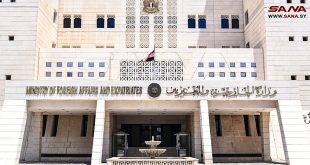Damascus, SANA – Ministry of Health is intensifying efforts to eradicate polio and restore Syria free of this disease through successive polio vaccination campaigns, and taking necessary measures to preserve these vaccines safe and secure.
In a joint statement with the World Health Organization (WHO) commemorating World Polio Day which is marked each year on Oct. 24, Minister of Health, Nizar Yaziji, said that the Ministry has adopted a precise plan to combat this disease, adding that this plan contributed to preventing its spread through providing necessary vaccines and distributing them on health centers and mobile teams to be given to all under-five children.
The Minister reiterated that the vaccines are guaranteed and imported from the best vaccine companies in the world, emphasizing the Ministry’s determination to go ahead with its national plans to eradicate polio virus from the country.
He noted that the armed terrorist organizations did not stop at spreading the polio virus in Syria with the first case has been detected in al-Mayadeen city in the eastern province of Deir Ezzor, rather they hindered the access of vaccines and children health services to several areas which suffer difficult circumstances due to the instigation, support and funding of the so-called Istanbul Council and sponsoring states.
Yaziji said that the terrorist groups have blocked the way of medical aid convoys several times and damaged their contents, touching upon the humanitarian catastrophe committed by the takfiri groups which gave spoiled vaccines to children in the northern province of Idleb claiming the lives of 15 and causing several suffocation cases.
The Health Minister stressed the Ministry’s commitment and unremitting efforts to protect Syria’s children against all serious diseases, particularly polio, with giving extra attention to children in high-risk and needed areas in order to maintain their good health.
He highlighted the parents’ cooperation since the first polio case has been announced in Syria after 24 years of absence, as well as the expertise and the professionality of health cadres at the health centers and members of the mobile vaccination teams who tour all rural areas and makeshift centers to ensure the vaccines to all children.
For her part, the WHO resident representative in Syria Elizabeth Huff stressed the organization’s support and cooperation with the Syrian Health Ministry to set up a response plan to combat polio virus, which has been declared as a public health emergency of international concern.
She said that the plan provided for conducting a series of vaccination campaigns and strengthening detection system to discover polio cases, noting that the results were positive as no new polio cases have been reported in Syria since January 21st, 2013 thanks to the cooperation and coordination between the Ministry and its concerned partners.
In the framework of international efforts exerted to prevent further spread of polio, the United Nations International Children’s Emergency Fund (UNICEF) announced determination to vaccinate 25 million children under five in the next few weeks in seven states, including Syria.
For her part, Maria Calivis, UNICEF Regional Director for the Middle East and North Africa indicated the remarkable progress which has been achieved since the outbreak of this disease in Syria last year, calling for intensifying efforts to help children grow and continue their lives.
She added that the national campaign, launched in October, targets 2,9 million children in Syria, considering it as a part of the international efforts to eradicate polio in the Middle East.
In turn, WHO Manager for Polio Eradication and Emergency Support, Chris Maher, said that Polio does still exist, although polio cases have decreased by over 99%, calling on parents to provide full support to vaccination campaigns which will last to the beginning of 2015.
R. Raslan / Ghossoun
 Syrian Arab News Agency S A N A
Syrian Arab News Agency S A N A




